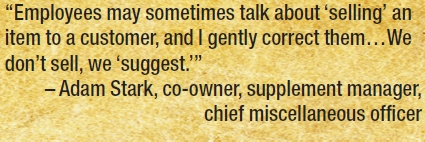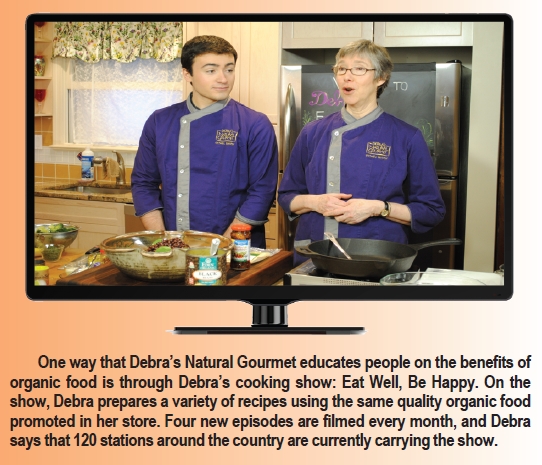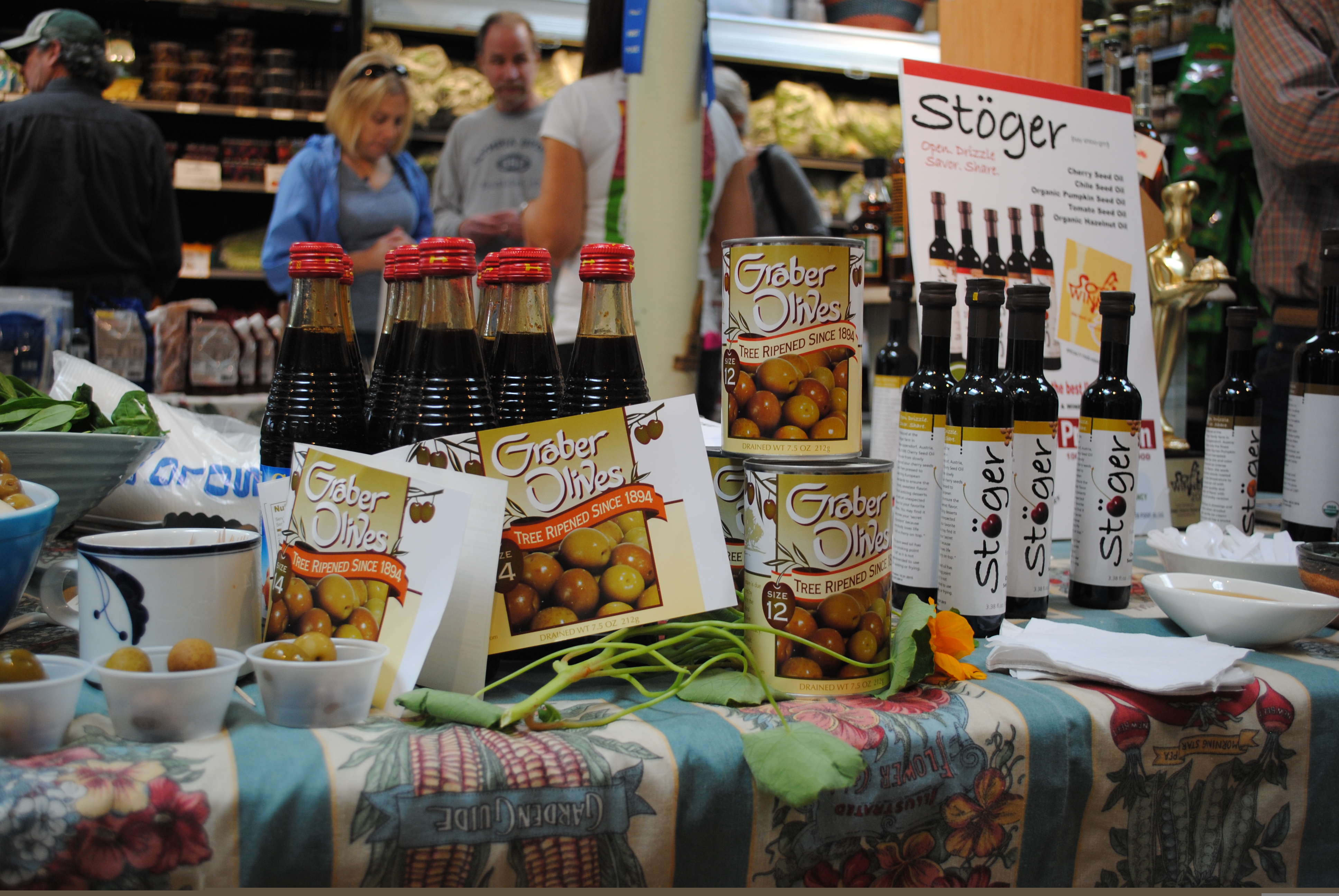It’s no secret that a consequence of the natural products industry’s expansion is an increase in mergers and acquisitions, which may help sate the newfound demand for natural goods. Sometimes, the building of megabrands and megastores can also come at the expense of smaller, independent businesses. This is not a foregone conclusion, though, as one innovative retailer has managed not only to survive, but also to thrive for over 25 years even in the midst of heavy competition, through an emphasis on building trust and loyalty among their consumer base. It is this achievement and innovation that makes Debra’s Natural Gourmet a perfect choice for the WholeFoods Magazine 2015 Retailer of The Year.
Building A Business
According to founder and owner Debra Stark, the mission that led to Debra’s Natural Gourmet is one that she has held on to since childhood: “getting people to eat organic and natural not just to bring the pleasures to the table, but to help lower healthcare costs in this country.” Part of doing this was using the same natural food items and remedies that she enjoyed in her childhood and making them accessible to those who may not know about them. However, there is a second part to the mission. Equally important to Debra was looking to her own community and neighborhood when thinking about creating a store, and “West Concord was a perfect fit.” In 1989, Debra’s Natural Gourmet was founded in Concord, MA, offering fresh soups from the store kitchen. “Our first soup was vegetarian split pea, and we also did a red ginger soup. We’re still making both soups today and they’re still just as popular,” she says.
Another early offering was cookies, though adhering to the principles of seeking out the most natural and organic ingredients created some initial hurdles. Adam Stark, co-owner, supplement manager, chiefmiscellaneous officer and Debra’s son, notes that they initially had a “no chocolate, no refined flour, no refined sugar, no coffee policy that handicapped us a little bit.” However, natural sweeteners like coconut sugars have “opened up a lot of possibilities since then,” he adds. Debra’s Natural Gourmet has now expanded to a large but carefully selected range of bulk-packaged and fresh natural and organic foods, including meals for take-out and catering. Debra’s also offers supplements, health and beauty items and Debra Stark’s own granola line, Stark Sisters Granola. While Debra says that the store itself is “a completely different animal” than at its founding in 1989, the central mission of promoting community through food is still very much the same.
|
Debra’s Natural Gourmet Quick Facts Founder: Debra Stark, CEO Year Founded: 1989 Number of Employees: ~50 Store Size: 3,200 ft2 Location: Concord, MA Mission: To provide organic foods, natural remedies, great customer service and education to the community. |
Going The Extra Mile
It is this mission that informs a lot of the ways that Debra’s does its business, and a community within the community has blossomed, with a regular clientele frequenting Debra’s Natural Gourmet not just as an errand, but a pleasant part of their everyday routine. This level of familiarity becomes a sort of symbiotic relationship, where the customers adapt their own lifestyle to incorporate the store itself as well as its offerings, at the same time, the business itself is informed by the presence of these repeat customers. Roxanne Bispham, kitchen manager and head chef, explains that the store’s kitchen is designed to be as “customer driven” as possible. “If they need something, they can ask without hesitation and know that we will try our hardest to provide it,” she explains, adding that this level of flexibility can be invaluable for those with allergies, special diets or simply an urgent need for a special item. As she puts it, “we show them loyalty, they are loyal back.”
The sense of developing loyalty and trust from the consumer end is not just limited to the store kitchen, either. Adam notes that when he runs the supplement section of the store “employees may sometimes talk about ‘selling’ an item to a customer, and I gently correct them…We don’t sell, we ‘suggest.’” He explains that customers may come in with a particular health concern or nutrient they may be looking to add to their diet, and rather than “sell” a certain item, the idea would be to listen to their concerns, then suggest a potential supplement that may meet their needs. Sometimes, this may even go to the extent of steering customers away from certain supplements that may not be the best fit for them. While this may sound confusing from a profit standpoint, Adam explains that “sometimes, the best thing you can do for sales is to tell someone not to buy something. Then they come back in a month or six months when they have a problem and they trust you, and that’s something that’s worked for us.”
Grace Pintabona, registered nurse and supplement specialist, shares the extent to which building trust can lead to loyal repeat customers. She states, “Many customers will see their physicians, but will then come visit me here to validate what they are being told to do,” she says. When customers see staff that’s willing to take that step to keep them in mind, she explains, “seeing that honesty reinforces that idea of trust.” The trust is what generates the repeat customers that come to Debra’s Natural Gourmet.
 The relationship between customer and employee is a crucial one in retail, and Debra’s has taken this to heart with a core of skilled and loyal employees, many posting double-digit work tenures. In a field where high turnover is common, how can one build and retain such an integral part of your business? Adam reflects on a recent Independent Natural Food Retailers Association (INFRA) sharegroup meeting he attended where he presented on employee hiring practices and retention. One thing he said was that “in a business where almost every one of our staff regularly interacts with the public, we do not hire people who need to be trained… They say in basketball you can’t train height and you can’t train speed. I don’t think you can train trustworthiness or a genuine desire to help people.”
The relationship between customer and employee is a crucial one in retail, and Debra’s has taken this to heart with a core of skilled and loyal employees, many posting double-digit work tenures. In a field where high turnover is common, how can one build and retain such an integral part of your business? Adam reflects on a recent Independent Natural Food Retailers Association (INFRA) sharegroup meeting he attended where he presented on employee hiring practices and retention. One thing he said was that “in a business where almost every one of our staff regularly interacts with the public, we do not hire people who need to be trained… They say in basketball you can’t train height and you can’t train speed. I don’t think you can train trustworthiness or a genuine desire to help people.”
Keeping the customer’s experience in mind and selecting employees who are not only passionate about said experience, but also the store and the mission itself, has paid dividends in good will in the town of Concord, according to Jim Leahy, general manager. Seeing the same friendly faces who are capable of providing what he calls “organic interaction” not only presents a familiar atmosphere, “but encourages more people like that… a lot of our best employees have come from our customers—people who have shopped here want to work here.” A larger business with many locations simply won’t have the luxury of such a select pool of employees, so maintaining such a standard of customer interaction is nearly impossible to match.
Jay Hovenesian, supplement specialist, says that providing exemplary customer service is important not just because of its own merits, but because “it is missing from other businesses, and the world in general. Some won’t take the time to hear, see or understand people.” Because Debra’s approaches customer service with the attitude of “not because we have to, but because we want to,” as he puts it, it helps the store stand out from other businesses where that specific type of interaction may not be present.
When it comes to retaining this level of quality workers, a level of trust has to be established fromemployer to employee as well. One way that Debra’s goes about showing this to its employees is through a staff meal, where each staff member is allotted a certain amount of money to either purchase food from the store kitchen for lunch or buy ingredients to bring home and cook. This costs the store around $6,000 a month, but Debra says it is worth it both to show appreciation to the employees and help them eat right, again harkening back to the company mission.

|
|
| Giving educated, honest advice is key. |
A happy employee is a productive one, but the way Debra’s selects and treats its staff can sometimes be beneficial in unexpected ways. Debra shares the story of hiring a teenager as an employee who also worked on a local farm, “so he brought us his boss! We’re now the farmer’s biggest customer in the summer and he comes and works for us during the winter. We have that kind of relationship with three farmers in the community now.” Jim adds that the farmers benefit from this as well, with customers knowing where the food they purchase at Debra’s is grown and raising their profile in the community.
In addition to employee interactions, Debra’s item selection reflects its commitment to the customer. Jim says that after doing a report last year to determine top-selling items, the highest item list was a category called “special order grocery.” “Special order grocery isn’t any one item,” he explains, “but rather hundreds of separate items that we don’t offer, but that we ordered at a customer’s request.” Debra says that while getting some of these items can require time and extensive paperwork, taking this extra step helps the store stand out. “We have people from all over New England who come here because we offer something they can’t get anywhere else. For example, I believe we’re the only store that offers camel’s milk for sale on the East Coast,” she says. This is another advantage of a small, singular store, as it allows for a variety of items that larger chains may not be able to match in multiple stores due to regulations or sheer scarcity.
The Three-Legged Stool
A recurring theme when talking about Debra’s Natural Gourmet and its success is the idea of a symbiotic relationship. Keeping to their vision of making natural foods and remedies available to the community in everything that they do has created a scenario where one aspect of the business benefits another. Consider the example of the customer who comes in looking for a supplement, only for the  employee to turn them away from a certain item because they know it’s not a match to their health need, while taking the time to explain why and suggesting something that may be a better fit. The customer gains the immediate benefit, but the business gets a long-term benefit when the customer returns with another issue and thinks of Debra’s first due to their past experience. Each aspect of the business feeds into another one, and vice versa.
employee to turn them away from a certain item because they know it’s not a match to their health need, while taking the time to explain why and suggesting something that may be a better fit. The customer gains the immediate benefit, but the business gets a long-term benefit when the customer returns with another issue and thinks of Debra’s first due to their past experience. Each aspect of the business feeds into another one, and vice versa.
Debra uses a metaphor that she says is common among retailers to describe how this all plays together: the three-legged stool. The three legs in this case are the customers, employees and suppliers/distributors/manufacturers who provide them with the products to sell. All three of these components are not only integral to the business itself, but also support each other as well. “Without these three strong legs, we would not be here,” she says.
Keeping in mind the three legs of the stool while adhering to the mission is what helps Debra’s deal with the trials of retail, where “every day has a crisis of some sort…from the refrigerator going down to someone having a meltdown to a produce truck going to New Hampshire instead of Concord, Massachusetts,” Debra jokes.
Jim says that when serious issues arise, in addition to sticking to the company mission, “thinking about doing your best internally first as opposed to what is going on around them” and focusing on positives is a way for stores to get through rough patches. One example Adam shares is when the store took turkey orders and prepared them for customers for Thanksgiving—only to find they were short about 40 turkeys when the truck came in. With customers’ holiday dinners in jeopardy, Debra went to a competing grocer, bought the turkeys at full retail price then sold them at a loss, because satisfying the customer was more important than the financial hit. Debra simply describes instances like that as “the cost of doing business.”
orders and prepared them for customers for Thanksgiving—only to find they were short about 40 turkeys when the truck came in. With customers’ holiday dinners in jeopardy, Debra went to a competing grocer, bought the turkeys at full retail price then sold them at a loss, because satisfying the customer was more important than the financial hit. Debra simply describes instances like that as “the cost of doing business.”
The Right Place
Along with promoting organic food and natural supplements, the second part of Debra’s mission is engaging the community, and Concord has proven to be both a welcoming and invested community for the store. Adam mentions that in addition to having traditional roots as a farming community, the city recently banned disposable plastic water bottles, demonstrating that it is a “town where people are committed to doing the right thing, where people care.” When the values of the community align with that of a local business, there’s a natural connection that can keep people coming in.
With this said, Debra’s Natural Gourmet has also engaged in many charitable initiatives to give back to the community that has supported it, to the point where it has won awards for its dedication to community engagement. A sampling of the many community projects the store engages in include Give Back Days, where a portion of the day’s earnings are donated to charities and local businesses, Stone Soup Dinners, where the kitchen cooks meals to celebrate local agriculture, and running cooking classes for the local Girl Scouts. In addition, a weekly allotment of food is always set aside for the local food bank—not just distressed items, but food set aside specifically for this purpose.

|
|
| A genuine desire to help brings success. |
Equally important as charity is education, something that goes hand in hand with the mission of getting people to eat and live healthier. In addition to the education that goes on in the store’s aisles every day, one popular educational initiative Debra’s has taken is its store newsletter. Rather than a static tool designed to announce promotions, Debra says that the newsletter is written “as if you were face-to-face. It’s as if you’re having a conversation with the customer.” Subjects include recipes, company announcements and nutrition articles.
Adam adds that proper research goes into the nutrition articles in the newsletters to ensure that readers are getting current and proper information, and that hard work pays off. In one instance, following a newsletter article about concussions, a customer came into the store and not only thanked the staff for the piece, but brought it into a local school and requested that it be used as a resource there.
Adam notes that the plan of the newsletter is “not to sell, but to inform,” and that philosophy has drawn in customer interest, which leads to further sales in the long haul. In addition, a more informed customer is better equipped to take the steps they need to support their own health, again bringing it back to the central mission.
Jay adds another educational opportunity the store provides: hosting talks from nationally known industry figures on various health topics. Guest speakers include figures like Michael T. Murray, ND, and Roy Upton, founder and executive director of the American Herbal Pharmacopoeia. Adam says extra care is taken when selecting these figures to make sure the main purpose of the talk is “to inform,” the same way the newsletter is put together.
Despite being over 25 years old, future plans are still relatively modest for this 3,200 ft2 space. Adam  explains that while the store has made an expansion to the left and expansion to the right over the past 25 years, limited retail space makes grander plans difficult. But, even if expansion may not necessarily be in the cards, he does have other improvements he’d like to implement. “With the skilled staff that we have, we’ve been flying by the seat of our pants…but I do want to implement more systems,” he explains. One such system that’s already been put into place is a revamped employee handbook to serve as a reference point for the staff. Debra adds that many of the long-time employees who have been the face of Debra’s to the people of Concord are looking to wind down in hours as they get older and look to enjoy life beyond the store. “It’s up to us now to take the new generation and make sure that they keep that level of service going,” she says.
explains that while the store has made an expansion to the left and expansion to the right over the past 25 years, limited retail space makes grander plans difficult. But, even if expansion may not necessarily be in the cards, he does have other improvements he’d like to implement. “With the skilled staff that we have, we’ve been flying by the seat of our pants…but I do want to implement more systems,” he explains. One such system that’s already been put into place is a revamped employee handbook to serve as a reference point for the staff. Debra adds that many of the long-time employees who have been the face of Debra’s to the people of Concord are looking to wind down in hours as they get older and look to enjoy life beyond the store. “It’s up to us now to take the new generation and make sure that they keep that level of service going,” she says.
At the same time, though, she reminds us that while the store itself may evolve, “the mission will not. Our mission is still what it’s been since day one. We want to be that place where everybody knows your name.” Considering the level of success that they already enjoy, this looks like a wise decision for Debra’s Natural Gourmet. WF
Published in WholeFoods Magazine, August 2015, (online 7/17/2015)










